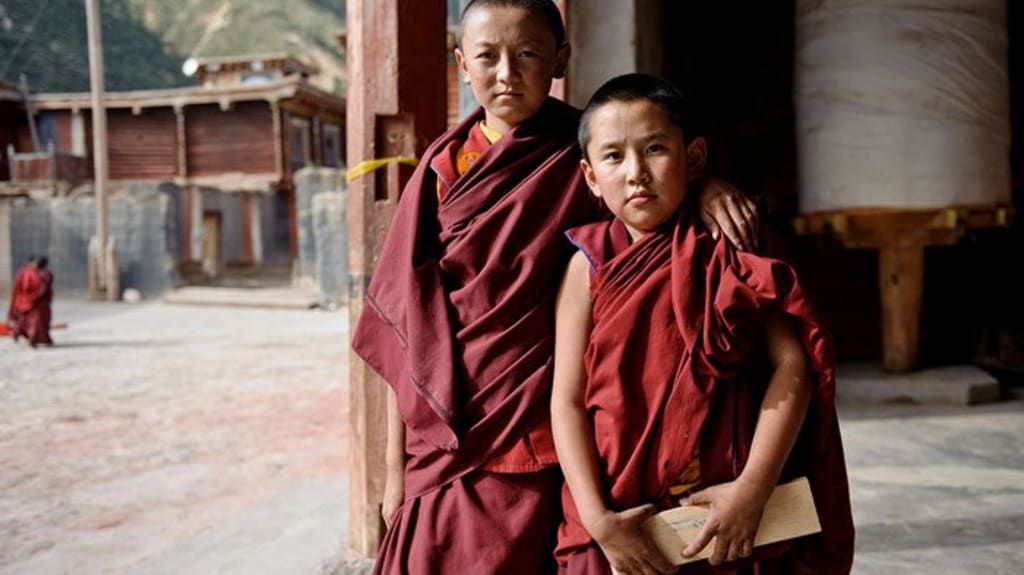
The man peered out through the window as we approached. The place looked like a storefront and it would not have been picture-worthy, except that we were on the Tibetan plateau, the highest region on Earth. Joseph, our Tibetan translator, struck up a conversation with the man, upon which he shyly invited us in. The inside of the store consisted of items like toilet paper, stale cookies, and Tibetan trinkets for sale to tourists. How does he make a living, I thought.
The group of us had gone to China, armed with our backpacks and two months’ supply of things, with a U.S.-based nonprofit organization called Caleb Project, which aims to mobilize support for minority ethnic groups around the world through collecting and disseminating information and media materials and relaying them to aid workers. Our job was to conduct ethnographic interviews among a Tibetan minority group that summer. I slowly absorbed everything in view--cups and utensils hanging on the wall, a brown stove in the middle of the floor of a tiny room--and it struck me that these few possessions were probably everything the man owned. Yet he proceeded to serve us yak butter tea, which in Tibetan tradition, would have been impolite to refuse.
Time passed unnoticed. As a sense of camaraderie developed, aided by the tea, we started to ask him questions: How long had he lived there? What was his daily income from his business? Did he have any family members? What were his hopes and aspirations? It turned out that his wife was deceased and he had a brother whom he helped to support; it was just him and his daughter living in the storefront house. As we were leaving, he gave us a big toothy grin, which saddened and humbled me.
Most of the Tibetans we met that summer had been generous, frank and unassuming. In this place where the rising and setting of the sun marked the days and the harsh winters necessitated the nomads' migration from place to place, the Tibetans somehow had eked out a way to survive. Recently though, changes from the inside as well as the outside have begun to uproot Tibetan culture. More young Tibetans, upon migrating to the cities to find jobs, have assimilated to mainstream Chinese culture, forgetting the Tibetan language in the process. Moreover, the government has threatened to strip the Tibetans of their lands with an increase in rampant Chinese tourism and economic development, which has caused the half-century hostility between the Tibetans and the Chinese to flare. Younger and older Tibetan generations alike are worried about whether or not their culture can withstand such a shift.
After the trip, we compiled the field notes we had typed after each day’s interviews into a final report which consisted of the breadth of information gleaned from our trip. The workers who had guided our work during the summer commented that we had helped to gather hard-to-obtain facts and stories from the Tibetans. Through this experience, I realized that my contribution paved the way for others who were interested in the Tibetans to have access to up-to-date information about them and about the region as a whole.
My excursion to Asia catalyzed me to think about how to assist minority groups like the Tibetans. Was it through helping to set up improved infrastructure, such as roads and hospitals? Through recounting their stories? And what actions could I take in the U.S.? I wrestled a lot with these questions that summer and beyond.
Spurred by these experiences, I pursued and graduated in 2009 with a Masters in international affairs with a concentration in International Development and a Certificate in Refugees and Humanitarian Emergencies through Georgetown University. I believed that understanding international law and institutions that affect people on the ground would equip me with concrete skills with which I can work specifically to improve situations of disadvantaged individuals and communities through NGOs and the UN. But as time progresses and as I head into my 40s, I also realized that it is through recounting and humanizing stories such as that of the man described above that would be most effective in capturing the voices of and thereby improving the conditions of not only the Tibetans but also hundreds of other minority groups, such as the Uighurs, in China who are persecuted every day because of their ethnic identities. With the advancement of AI facial recognition technology, there have been a proliferation of stories about the Chinese government's efforts to restrict freedom of religion, speech and movement among the Uighurs, for example, in the last two years. By continuously travelling to and relaying the stories of these marginalized groups and voices of individuals in places even as remote as the Tibetan plateau, I hope to shed light on a region that is being encroached upon by the Chinese government and authorities.
If you liked this story and would like to enable to continue to travel to these regions and write about these stories, please feel free to leave a tip! :)
About the Creator
Susan Lee
I graduated from Stanford University in 2002 with a BA in International Relations and a minor in Psychology and have a Masters in International Affairs from Georgetown University.






Comments
There are no comments for this story
Be the first to respond and start the conversation.